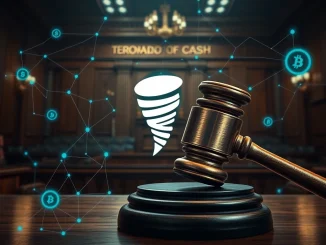
Vitalik Buterin, the prominent co-founder of Ethereum, recently took to X (formerly Twitter) to share his thoughts on a critical issue facing the digital world: the balance between security, freedom, and privacy. His comments, made in response to an interview with Tornado Cash founder Roman Storm ahead of his upcoming trial, underscore a significant hope for the future role of the United States in this evolving landscape. This discussion is particularly relevant for anyone navigating the complexities of cryptocurrencies and online interactions.
What Did Vitalik Buterin Say About Data Privacy?
Vitalik Buterin articulated a clear vision for the United States’ potential leadership role in the digital age. He stated his hope that the U.S. can “lead the way in making a more secure world with stronger freedoms and fewer data leaks a reality.” This isn’t just a general statement; it’s tied directly to the ongoing challenges faced by developers building tools aimed at enhancing user privacy.
His remarks highlight a desire for a future where individuals have greater control over their personal information and digital interactions are less susceptible to unwanted surveillance or breaches. This pursuit of enhanced data privacy is a cornerstone of many decentralized technologies, including those within the Ethereum ecosystem.
The Context: The Tornado Cash Trial and Digital Freedom
Buterin’s comments were specifically prompted by an interview featuring Roman Storm, one of the co-founders of Tornado Cash. Tornado Cash is a cryptocurrency mixer designed to improve transaction privacy on the Ethereum blockchain. Storm faces charges in the U.S. related to money laundering and sanctions violations, stemming from the alleged use of Tornado Cash by illicit actors.
The legal proceedings against individuals associated with privacy-enhancing technologies like Tornado Cash have sent ripples through the developer community. Many see these cases as potentially chilling innovation in tools designed to protect user privacy. Buterin’s statement directly addresses this concern, suggesting that the first crucial step for the U.S. is “sending a clear signal to developers that this important work [of ensuring privacy of messaging without backdoors and hacks] is welcome.” This speaks directly to the concept of digital freedom – the ability to innovate and build tools without fear of prosecution simply for creating technology that *could* be misused, rather than actively participating in illicit activities.
Why is This ‘Important Work’?
Buterin’s emphasis on the ‘important work’ of developers building privacy tools is crucial. In an era where data breaches are common and digital footprints are constantly tracked, tools that allow individuals to communicate and transact privately are increasingly necessary. This doesn’t imply support for illegal activities, but rather the development of foundational technologies that can protect the privacy of law-abiding citizens.
Think of it like encryption: while encryption can be used by criminals, it’s also essential for securing online banking, private communications, and protecting sensitive personal data. Similarly, privacy tools in crypto are argued by proponents to be vital for protecting users from surveillance, unwanted tracking, and potential discrimination based on their financial transactions.
Vitalik Buterin’s Hope for US Leadership
The hope expressed by Vitalik Buterin places the onus on the United States to set a precedent. Given its historical role in technological innovation and its significant influence on global policy, how the U.S. approaches privacy-preserving technologies could impact developers and users worldwide. A welcoming stance, as suggested by Buterin, could foster innovation and encourage the development of more secure and private digital systems.
Conversely, a hostile regulatory environment could stifle progress and potentially push development of such tools underground or to other jurisdictions. The outcome of cases like the Tornado Cash trial is therefore seen by many as a bellwether for the future of privacy in the digital realm.
Navigating US Crypto Regulation and Privacy
The current landscape of US crypto regulation is complex and often uncertain. Regulators are grappling with how to oversee a rapidly evolving technology, balancing concerns about illicit finance with the desire not to hinder innovation. Buterin’s comments serve as a timely reminder that amidst regulatory efforts, the fundamental principles of privacy and freedom should not be overlooked.
For developers, the signal they receive from regulatory actions is paramount. Clarity and a recognition of the legitimate uses of privacy technology are essential for fostering a healthy environment for building the next generation of secure and private digital infrastructure.
Challenges and Opportunities
The path forward involves navigating significant challenges while recognizing key opportunities:
- Challenges: Balancing privacy needs with regulatory demands for transparency and anti-money laundering (AML) measures; defining the legal liability of developers who create neutral tools; addressing the potential for misuse of privacy tools by bad actors.
- Opportunities: The U.S. can lead in developing balanced regulatory frameworks; foster innovation in privacy-preserving technologies; set a global standard for digital rights and digital freedom; attract top developer talent.
Conclusion: A Call for Balance and Support
Vitalik Buterin’s recent remarks serve as a powerful call for the United States to actively champion stronger data privacy and digital freedom. By highlighting the context of the Tornado Cash case, he underscores the need for the U.S. to send a clear message of support to developers building essential privacy tools. The hope is that through thoughtful regulation and a recognition of the importance of privacy, the U.S. can indeed lead the way towards a more secure and free digital future for everyone involved in the crypto space and beyond. How the nation responds to this call will significantly shape the trajectory of digital rights and technological innovation.



